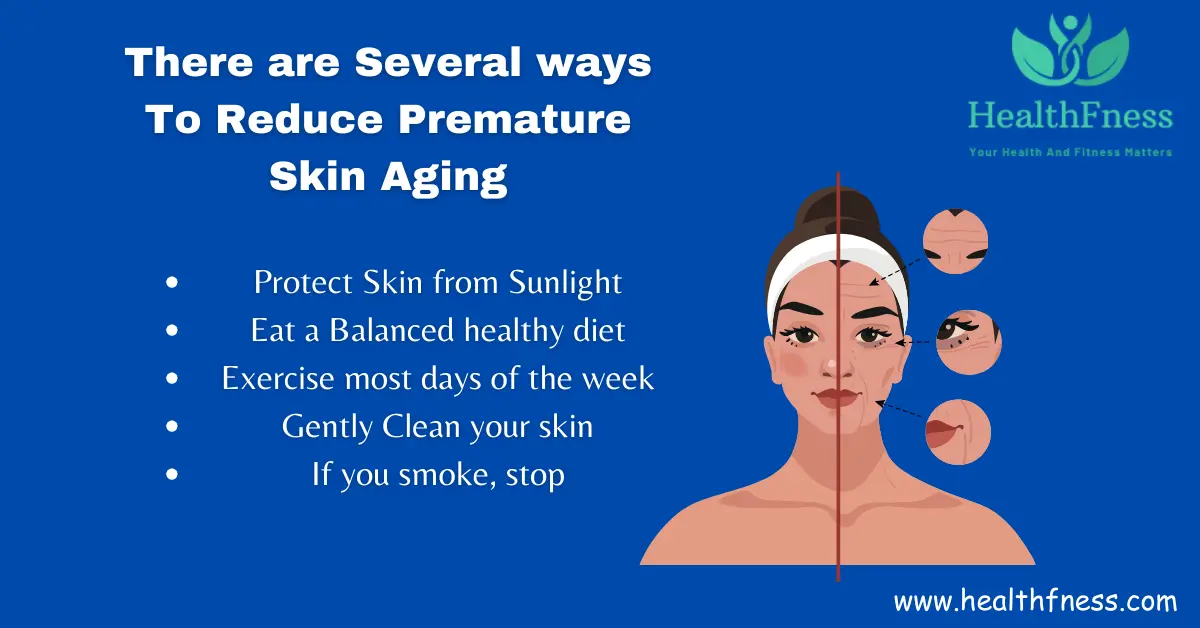How to delay skin aging? Food, supplementation, and habits to delay skin aging
In recent decades, research on anti-aging medicine has multiplied and concepts such as “cellular senescence” (cells lose their ability to multiply) or healthy longevity are the object of study by scientists around the world in order to delay cellular aging (which would be typical of biological age) and reach a higher chronological age (that of the years we turn) in a healthier way.
Importance of skin aging prevention
Age-related skin aging is a normal process that happens to everyone. However, environmental factors including UV exposure, pollution, stress, and bad lifestyle choices can also contribute to premature skin aging. Wrinkles, fine lines, age spots, and a lack of elasticity and firmness in the skin can all be symptoms of premature skin aging.
Factors that contribute to skin aging
Premature skin aging can be caused by a variety of factors. These consist of:
UV exposure
The sun’s rays or those from tanning beds can cause skin damage and early aging.
Pollution
Environmental contaminants like pollution and cigarette smoke can expose people to accelerated aging of their skin.
Bad lifestyle choices
Smoking, binge drinking, eating poorly, and not exercising can all hasten the aging process of the skin.
Stress
Prolonged stress can lead to oxidative stress and inflammation, both of which accelerate the aging process of the skin.
Genetics
Premature skin aging may run in some people’s families.
The skin, a living organism
Undoubtedly, the skin is a reflection of our aging and although there are intrinsic factors such as the genotype, on which it is more difficult to act, as it is a living organism in constant regeneration, depending on the stimuli it receives, it will age more or less quickly. . Numerous scientific investigations have proven that:
- healthy lifestyle habits (avoid tobacco and alcohol, manage stress and sleep, and exercise),
- adequate nutrition: consumption of fruits and vegetables (for the supply of minerals and antioxidants), whole grains (for B vitamins), nuts (AGE) and proteins of vegetable origin,
- take care of our digestive system and its microbiota,
- massages to improve blood circulation and reorder the fibers,
- and the intake of some supplements (antioxidants, vitamins, minerals, and protein nutrients),
Food for Skin Health/Delay Skin Aging
It takes more than applying creams and lotions to keep the skin looking healthy and young. The state of your skin is a mirror of your internal health. As a result, the condition and look of your skin can be greatly influenced by what you eat and drink. We’ll talk about the value of nutrition for skin health in this blog, covering foods high in vitamins and antioxidants, the necessity of staying hydrated, and items to steer clear of.

Foods High In Vitamins And Anti-oxidants
Compounds known as antioxidants shield the body’s cells from the harm that free radicals can do. Unstable chemicals called free radicals have the potential to harm cells, including skin cells. Consuming meals high in antioxidants can therefore assist to shield your skin from harm and early aging.
You may Also Read: Want to get healthy skin? 10 star foods to maintain young and healthy skin
Some Examples Of Antioxidant-Rich Foods Include
- Berries such as blueberries, raspberries, and strawberries
- Dark leafy greens such as spinach and kale
- Nuts and seeds such as almonds and sunflower seeds
- Fish such as salmon and tuna
- Vegetables such as carrots, sweet potatoes, and bell peppers
- Citrus fruits such as oranges and lemons
Vitamin-Rich Foods Include, For Instance
Sweet potatoes, carrots, spinach, and kale all contain vitamin A.
Citrus fruits, bell peppers, strawberries, and broccoli all contain vitamin C.
Nuts, seeds, avocado, and spinach all contain vitamin E.
Importance of hydration
Water consumption is crucial for maintaining healthy skin. Your skin may look dry, flaking, and dull if it is dehydrated. Enough water consumption can maintain your skin moisturized, youthful-looking, and plump. It is advised to consume at least 8 glasses of water each day, with more if you are active or out in the sun.
Foods to avoid
In addition to consuming foods that promote good skin, it’s critical to stay away from those that hasten to age. Some of the worst offenders are:
Sugar
An excessive amount of sugar in your diet can result in the creation of AGEs, which can harm the collagen and elastin in your skin.
Processed meals
Processed foods frequently include high salt levels, which can cause water retention and facial puffiness.
Alcohol
Drinking too much alcohol can dry out your skin and cause inflammation and redness.
Supplementation for skin health
Many of the nutrients your skin needs to keep healthy or delay skin aging may be obtained from a healthy diet, but occasionally that is insufficient. Supplements might be a useful addition to your skincare routine in certain situations. These are three key points to be aware of while using vitamins to promote skin health.
Supplements To Boost The Production Of Collagen
A protein called collagen is necessary for having healthy skin. It can help lessen the visibility of fine lines and wrinkles and keep your skin supple and firm. Our bodies create less collagen as we get older, which can cause the skin to lose its flexibility. The following supplements can assist increase collagen production:
Collagen peptides
These supplements contain collagen peptides, which are fragments of hydrolyzed collagen that are easier for your body to absorb.
Vitamin C
Taking a dose of vitamin C helps maintain healthy skin since it is necessary for the creation of collagen.
Hyaluronic acid
This substance aids in the moisture retention of your skin, which lessens the appearance of wrinkles and fine lines.
Vitamins and minerals that support skin health/Delay skin aging
Several other vitamins and minerals, in addition to collagen, can maintain healthy skin. They consist of:
Vitamin A
This vitamin is crucial for the development and maintenance of skin cells.
Vitamin E
Vitamin E is an antioxidant that can help shield your skin from oxidative stress.
Zinc
This element is crucial for having good skin since it strengthens the immune system and aids in controlling oil production.
Selenium
This mineral can aid in defending your skin against UV radiation damage.
Precautions for supplement use
While adding supplements to your skin care regimen might be beneficial, it’s vital to be aware of any dangers and adverse effects. These are some safety measures to remember:
Talk to your doctor
Before ingesting any new supplements, consult your doctor to ensure that you can use them safely.
Pay attention to the appropriate dosage
Taking supplements in excess might be harmful, so pay attention to the dosage suggested on the label.
Be mindful of interactions
If you are on any prescription medications, talk to your doctor before taking any supplements because they may interact with any medications you may be taking.
Habits to delay skin aging
Many practices can help prevent the signs of age and keep your skin appearing healthy and youthful, even though genetics play a part in the aging process. Here are five crucial behaviors to include in your regular activities.
Daily skincare routine
Developing a daily skincare practice can help you maintain healthy-looking skin and delay the signs of aging. This entails twice-daily cleaning, toning, and moisturizing of your skin in addition to the use of a serum or other treatment product that addresses your particular skin issues.
Sun protection
Exposure to the sun’s dangerous UV radiation is one of the main causes of early aging. Every day, even on cloudy days, you should wear sunscreen with an SPF of at least 30 to protect your skin. Avoid spending time in the sun during peak hours and use protective clothes like a hat and sunglasses (10 a.m. to 4 p.m.).
Exercise and physical activity
Frequent exercise is beneficial for your general health as well as for your skin’s beauty. Workout enhances circulation, which contributes to a healthy glow on your skin. Also, it aids in stress reduction, which can improve the appearance of your skin.
Stress management
Persistent stress can speed up the aging process by creating inflammation and harming the collagen and elastin in your skin. Make time for your favorite activities and try relaxation methods like yoga or meditation to help you handle stress.
Avoiding smoking and drinking too much alcohol
Smoking and binge drinking have a bad effect on the appearance of your skin by creating wrinkles, dryness, and discoloration. If you smoke, quitting can help your skin look better over time. Alcohol consumption should also be kept to a minimum to avoid dehydration, which has been linked to early aging.
FAQS
Do certain meals prevent the aging of the skin?
Certainly, eating foods high in antioxidants and vitamins can help you maintain healthy, youthful-looking skin. They consist of fresh produce, nuts, seeds, and fatty fish.
Which vitamins can slow the aging process of the skin?
Hyaluronic acid, vitamin C, and collagen peptides are a few supplements that can maintain healthy skin and increase collagen production. Skin health can also be supported by vitamins A and E, as well as minerals like zinc and selenium.
What qualities should a sunscreen have if I want to prevent my skin from aging?
Choose a broad-spectrum sunscreen with a minimum SPF of 30. This will assist in shielding your skin from UVA and UVB radiation, which can hasten the aging process of your skin.
Is it true that exercise can postpone skin aging?
Certainly, regular exercise can enhance circulation and lower stress, both of which can enhance the appearance of your skin.
What effective stress-reduction methods can help prevent the aging of the skin?
Deep breathing, yoga, and other relaxation exercises can help manage stress and promote good skin.
Is there anything I should eat or drink to avoid aging my skin?
Foods heavy in saturated fat, sugar, and processed foods can all accelerate the aging process of the skin and cause inflammation.
Conclusion
Finally, there are a number of strategies to postpone the appearance of skin aging or delay skin aging and preserve a young, healthy complexion. Supplements that encourage collagen formation and supply essential vitamins and minerals, as well as a balanced diet rich in antioxidants and vitamins, can support skin health. Regular exercise, stress management, sun protection, and abstaining from smoking and excessive alcohol use are all daily practices that can slow the aging process of the skin.
Video Credits:

